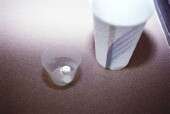(HealthDay) -- Low-dose thalidomide successfully induces complete response in a majority of patients with refractory cutaneous lupus erythematosus (CLE), according to research published in the March issue of the British Journal of Dermatology.
To evaluate the clinical efficacy and safety of thalidomide and establish prognostic factors of clinical outcome, J. Cortés-Hernández, M.D., of the Universitat Autònoma de Barcelona in Spain, and colleagues conducted a prospective observational study involving 60 consecutive patients with refractory CLE who were treated with 100 mg per day of thalidomide. The treatment was completed by all patients except one who discontinued due to side effects.
During the eight-year follow-up period, the researchers found that 98 percent of subjects achieved a clinical response, which was noticeable at two weeks after treatment. Eighty-five percent of patients experienced a complete response. Clinical relapse occurred for 70 percent of patients, usually five months after withdrawal or reduction of treatment. Subjects with subacute CLE were 30 times more likely to achieve long-term remission after treatment discontinuation (odds ratio, 30), while those with discoid lupus erythematosus were significantly more likely to relapse with treatment discontinuation (odds ratio, 5.71). Neurological symptoms associated with thalidomide treatment included paraesthesia (18 percent), which was confirmed as sensory polyneuropathy in five of eleven patients. Symptoms resolved 12 months after treatment withdrawal.
"Thalidomide has proven to be effective in patients with refractory CLE," the authors write. "Based on these results, low-dose thalidomide should be given prime consideration in the treatment of antimalarial drug-resistant CLE, but always under careful clinical surveillance."
More information:
Abstract
Full Text (subscription or payment may be required)
Journal information: British Journal of Dermatology
Copyright © 2012 HealthDay. All rights reserved.


















